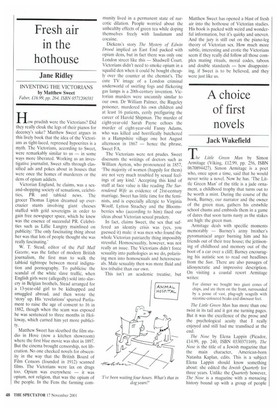Fresh air in the hothouse
Jane Ridley
INVENTING THE VICTORIANS by Matthew Sweet
Faber, £16.99, pp. 264, ISBN 0571206581
How prudish were the Victorians? Did they really cloak the legs of their pianos for decency's sake? Matthew Sweet argues in this lively book that the idea of the Victorians as tight-laced, repressed hypocrites is a myth. The Victorians, according to Sweet, were remarkably similar to us — in some ways more liberated. Working as an investigative journalist, Sweet sifts through classified ads and pokes about in houses that were once the homes of murderers or the dens of opium addicts.
Victorian England, he claims, was a sexand-shopping society of sensations, celebrities, PR and tabloid news. The grocer Thomas Lipton dreamed up evercrazier stunts involving giant cheeses stuffed with gold sovereigns in order to gain free newspaper space, which he knew was the essence of successful PR. Celebrities such as Lillie Langtry mainlined on publicity: 'The only fascinating thing about her was that lots of people thought she was really fascinating.'
W. T. Stead, editor of the Pall Mall Gazette, was the father of modern British journalism, the first man to walk the tabloid tightrope between moral indignation and pornography. To publicise the scandal of the white slave traffic, when English girls were (allegedly) sold into slavery in Belgian brothels, Stead arranged for a 13-year-old girl to be kidnapped and smuggled abroad, and then wrote the 'story' up. His 'revelations' spurred Parliament to raise the age of consent to 16 in 1882, though when the scam was exposed he was sentenced to three months in Holloway, which earned him yet more publicity.
Matthew Sweet has sleuthed the film studio in Hove (now a kitchen showroom) where the first blue movie was shot in 1897. But the cinema brought censorship, not liberation. No one checked novels for obscenity in the way that the British Board of Film Censors (founded in 1912) scanned films. The Victorians were lax on drugs too. Opium was everywhere — it was opium, not religion, that was the opium of the people. In the Fens the farming corn
munity lived in a permanent state of narcotic dilation. People worried about the unhealthy effects of green tea while doping themselves freely with laudanum and cocaine.
Dickens's story The Mystery of Edwin Drood implied an East End packed with opium dens, but in fact there was only one London street like this — Shadwell Court. Victorians didn't need to smoke opium in a squalid den when it could be bought cheaply over the counter at the chemist's. The cute TV image of a London criminal underworld of swirling fogs and flickering gas lamps is a 20th-century invention. Victorian murders were uncannily similar to our own. Dr William Palmer, the Rugeley poisoner, murdered his own children and at least 16 patients, eerily prefiguring the career of Harold Shipman. The murder of eight-year-old Sarah Payne echoes the murder of eight-year-old Fanny Adams, who was killed and horrifically butchered in a Hampshire village one hot August afternoon in 1867 — hence the phrase, Sweet FA.
The Victorians were not prudes. Sweet discounts the writings of doctors such as William Ayrton, who pronounced in 1857, 'The majority of women (happily for them) are not very much troubled by sexual feelings of any kind.' Accepting this kind of stuff at face value is like reading The Surrendered Wife as evidence of 21st-century marriage. Sweet has little time for the feminists, and is especially allergic to Virginia Woolf, Lytton Strachey and the Bloomsberries who (according to him) fixed our ideas about Victorian sexual prudery.
In fact, claims Sweet, the sex that suffered an identity crisis was (yes, you guessed it) male: it was men who found the whole Victorian patriarchy thing impossibly stressful. Homosexuality, however, was not really an issue. The Victorians didn't force sexuality into pathologies as we do, polarising men into homosexuals and heterosexuals. Male sexuality then was more fluid and less tribalist than our own.
This isn't an academic treatise, but Matthew Sweet has opened a blast of fresh air into the hothouse of Victorian studies. His book is packed with weird and wonderful information, but it's quirky and uneven. And the jury is still out on the piano-leg theory of Victorian sex. How much more subtle, interesting and erotic the Victorians seem if they really did follow all those complex mating rituals, moral codes, taboos and double standards — how disappointing, if Sweet is to be believed, and they were just like us.






















































































 Previous page
Previous page